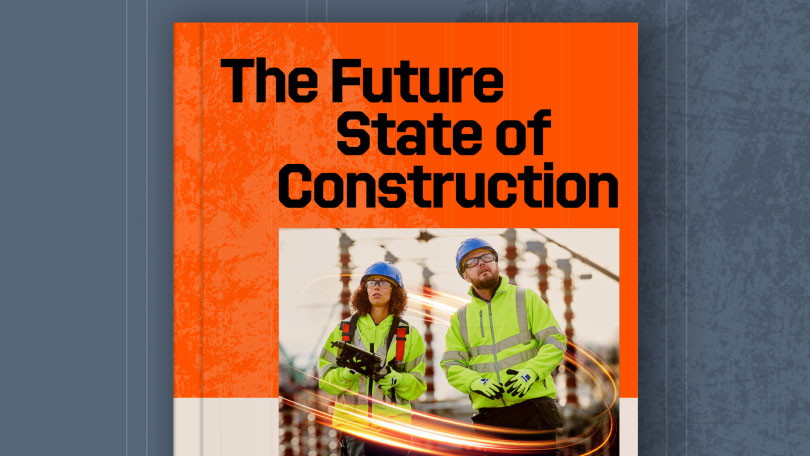— 5 min read
The Human-AI Partnership: Cultivating a Future-Ready Workforce in Civil Construction

Last Updated Sep 10, 2025

Preeya Selvarajah
Senior Product Marketing Manager
Preeya is a Senior Product Marketing Manager at Procore, where she leads go-to-market strategy, product positioning, and competitive intelligence across the APAC region. With nearly two decades of experience in enterprise SaaS, she has worked across construction management tech, industrial automation, telematics & fleet management, and ERP solutions, bringing domain expertise and a customer-centric approach to her work. At Procore, she partners with product, sales, and customer teams to articulate how Procore's platform capabilities such as digital project delivery, quality & safety, and construction financials drive measurable impact on-site and in the office. Preeya is passionate about helping construction businesses unlock digital transformation and make smarter, data-driven decisions at scale.
Samantha Nemeny
33 articles
Sam—Samantha if she’s feeling particularly academic—has spent a decade in content marketing, with eight years focused on Australia’s construction industry. She has a knack for making complex ideas easy to understand, turning industry jargon into clear, engaging stories. With a background in SEO and marketing, she’s spent the past three years at Procore, helping industry professionals navigate the world of construction with content that’s both insightful and easy to digest.
Last Updated Sep 10, 2025

The civil construction industry is at a crossroads, poised between traditional methodologies and a technologically advanced future. As projects grow in scale and complexity, the integration of artificial intelligence (AI) is no longer a distant concept but an immediate reality.
Yet, for many, the conversation around AI often veers into concerns about job displacement. A recent key perspective within the industry is that AI won't take jobs, but rather, those who know how to use AI effectively will be the ones who thrive.
The future of civil construction lies not in AI replacing humans, but in a powerful, collaborative partnership between the two. Cultivating this human-AI partnership is key to building healthy people and cultures and driving unprecedented efficiency and productivity.
Table of contents
Attracting and Retaining Talent Through AI Adoption
For owners and C-suite executives, understanding the workforce adaptation to AI is becoming increasingly important for strategic planning and recruitment. The younger generation, more accustomed to digital tools, has exhibited a greater receptiveness to AI — and this technological affinity can be a powerful magnet for attracting new talent to an industry that has historically faced recruitment challenges.
Companies showcasing their use of AI-powered project management platforms, drone-based site mapping or augmented reality tools for design visualisation can make a career in civil construction appear far more cutting-edge and engaging to recent graduates than traditional perceptions might suggest.
By embracing AI, companies can signal a commitment to innovation, making civil construction a more appealing and dynamic career path. This is not just about appealing to new recruits — it's about retaining the best employees by equipping them with cutting-edge tools that empower them to work smarter and more effectively.
Bridging the Skills Gap: Training for the AI Era
One of the key challenges of embracing AI lies in bridging the gap between fundamental construction skills and the effective utilisation of AI tools.
It's not enough to simply introduce AI: Comprehensive training programs are essential. These programs must be carefully designed to balance the teaching of AI applications with the reinforcement of core craft skills and foundational construction knowledge.
For example, a heavy equipment operator might learn how AI-driven guidance systems improve grading precision while simultaneously refining their manual control skills for complex maneuvers or challenging terrain where human judgment is most important.
Imagine a project manager who, instead of spending hours manually crunching data for a schedule, can now use AI to generate baseline efficiency plans in seconds, allowing them to focus on nuanced problem-solving and on-site oversight.
The goal is to empower workers to do more with less, using AI to streamline administrative tasks and provide analytical baselines, thereby freeing up their valuable time and expertise for core construction activities.
AI as a Tool to Drive Efficiency and Productivity
This focus on empowering the workforce directly translates into significant gains in efficiency and productivity. AI applications in construction operations can provide baseline efficiency plans within seconds, analysing trends to optimise crew sizes, equipment needs and production rates. Industry experts acknowledge that this dramatically reduces the manual effort traditionally required for planning and scheduling.
On a large highway construction project, AI can analyse dozens of variables — including soil conditions, material delivery logistics and anticipated traffic disruptions — to propose an optimal daily work schedule, something that would take a human planner days to devise manually.
For project managers, this means the ability to plan daily and weekly schedules and adjust for maximum efficiency with unparalleled speed and accuracy.
For the C-suite, it signifies optimised resource management and allocation, leading to a more streamlined and responsive workflow across all projects.
Improving Project Quality and Boosting Innovation
Beyond efficiency, AI plays a role in enhancing project quality. AI empowers workers to make more informed decisions on the ground — at better speeds — by providing real-time visibility into project performance and leveraging project data to improve scheduling and forecasting. This means better quality control, improved adherence to specifications — and ultimately, a higher standard of construction.
AI-powered image recognition can be used to scan concrete pours for imperfections, or inspect weld integrity, providing immediate feedback to workers for rectification, far faster and more consistently than manual inspections.
The concern that fundamental skills might be lost as AI handles more tasks is valid and underscores the need for continuous education that reinforces both traditional and technological competencies. The human element remains vital for critical thinking, adaptability and the nuanced problem-solving that AI, despite its sophistication, cannot fully replicate.
The integration of AI can also help build a culture of innovation and continuous improvement. When employees see their work being made easier and more effective through technology, it cultivates a positive and proactive mindset. This can lead to a more engaged workforce, reducing turnover and contributing to a healthier, more collaborative work environment.
Building a culture that values both human expertise and technological advancement is key for long-term success and growth. It's about demonstrating to employees that the company is investing in their future, equipping them with the tools they need to excel in an evolving industry.
Construction: A Collaborative Human-AI Endeavor
The widespread adoption of AI in civil construction is not merely about technological advancement; it's about forging a new kind of partnership — a human-AI collaboration that elevates both human potential and project outcomes. The civil construction industry can cultivate a future-ready workforce by strategically investing in training, embracing the receptiveness of the younger workforce and cultivating a judicious balance between AI-driven efficiency and indispensable human oversight.
Categories:
Written by

Preeya Selvarajah
Senior Product Marketing Manager | Procore
Preeya is a Senior Product Marketing Manager at Procore, where she leads go-to-market strategy, product positioning, and competitive intelligence across the APAC region. With nearly two decades of experience in enterprise SaaS, she has worked across construction management tech, industrial automation, telematics & fleet management, and ERP solutions, bringing domain expertise and a customer-centric approach to her work. At Procore, she partners with product, sales, and customer teams to articulate how Procore's platform capabilities such as digital project delivery, quality & safety, and construction financials drive measurable impact on-site and in the office. Preeya is passionate about helping construction businesses unlock digital transformation and make smarter, data-driven decisions at scale.
View profileReviewed by
Samantha Nemeny
33 articles
Sam—Samantha if she’s feeling particularly academic—has spent a decade in content marketing, with eight years focused on Australia’s construction industry. She has a knack for making complex ideas easy to understand, turning industry jargon into clear, engaging stories. With a background in SEO and marketing, she’s spent the past three years at Procore, helping industry professionals navigate the world of construction with content that’s both insightful and easy to digest.
View profileExplore more helpful resources

Pull Planning in Construction: A Practical Implementation Guide
When teams plan in isolation, handoffs are unclear, and constraints emerge too late to influence the sequence, the outcome is predictable: Construction projects slip. This reduces schedule reliability and increases...

Construction Material Takeoffs: The Hidden Lever of Profit, Precision and Project Certainty
Accurate material takeoffs protect profit by controlling the most significant variables in project delivery: material cost and consumption. Incorrect quantities mean compromised budgets, forecasts and tender pricing. From there, a...

The Essential Guide to Construction Work in Progress (WIP)
Most construction financial problems don’t explode overnight — they drift quietly until month-end, when it’s too late to fix the damage. Work-in-progress (WIP) accounting changes that dynamic. When WIP is...

Overbilling in Construction: What It Is and How to Manage It
Does the billing actually reflect the work completed? That question isn’t always asked during a smooth progress claim. It usually comes up when certification tightens, a client challenges a payment...
